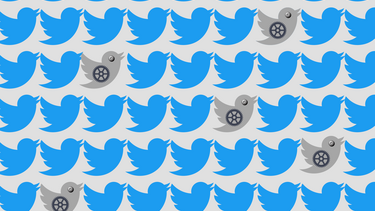Is Elon Musk Right about the Bot Problem on Twitter?
When he announced that he was buying Twitter, Elon Musk said his goals included “defeating the spam bots.” Two months later, he withdrew his offer, claiming that the company had failed to make data on bots available to him. We asked Prof. Tauhid Zaman, who has studied the impact of bots, how much they skew the experience of Twitter users.

Elon Musk is ostensibly pulling out of the purchase of Twitter because there are more bots on the platform than the company claimed. What is the real prevalence of bots on Twitter?
In my research I have studied the bots in different discussions on Twitter. I found that the prevalence of active bots varies from 1% to 14%, depending on the topic being discussed. A bigger concern is the impact these bots can have on discussions. Bots can be extremely active on Twitter, much more than a normal human, or even an abnormal human. In a study of the first impeachment of Donald Trump, we found that bots were 1% of the active users, but posted 31% of the tweets. This is an insane number of tweets for such a small number of bots, and this can artificially distort the discussion. The number of active bots is a concern, but I think the number of bot tweets is an even greater concern.
The number of active bots is a concern, but I think the number of bot tweets is an even greater concern.
How much do bots affect our experience of Twitter and/or public opinion?
If bots tweeted, but had no audience, they would not have a major impact on your Twitter experience or public opinion. The danger posed by bots is that they also have many followers, giving them the ability to impact opinions. In our Trump impeachment study, we found that although the bots were only 1% of the active users, they were followed by over 24% of the active users. This massive reach combined with their elevated activity levels allows bots to conduct large-scale opinion manipulation. Imagine hundreds of thousands, or even millions, of Twitter users having their timelines continuously flooded with bot tweets for weeks, months, or years. Over time, this can have a persuasive effect on a large population. If the bots are operated by malicious actors, this can pose a threat to the population.
Musk has criticized Twitter for using human judgment to identify the prevalence of bots. Is there a better way?
Human judgment is a good starting point, but the things that humans look for in identifying bots can be taught to an AI. This has been done by different researchers, myself included. One popular tool is known as the Botometer, which feeds many features about an individual Twitter account to an AI algorithm to measure how likely the account is to be a bot. My research group developed another algorithm based on ideas from statistical physics to identify multiple bots simultaneously in online discussions. The nice thing about these algorithms is that they can be combined to make even better algorithms, so there is no reason why bot detection cannot be improved using AI.
There are a number of reasons why AI tools may not be deployed at scale by Twitter to detect bots. If we are being charitable to Twitter, we could argue that AI tools are not perfect and may identify human users as bots. These false positives could ruin the user experience, and so it is safer to be conservative and rely on sophisticated human judgment. However, another reason why Twitter may not want to conduct a massive bot purge using automated AI algorithms is because this would reduce their active user count.
It is a strange situation for Twitter. They would be happy with many bots on their platform if no one knew they were bots and it did not ruin the user experience. However, once people start noticing the large number of bots, that is when there is a problem. Who wants to be on a platform full of bots? This can ruin the platform reputation and lead to a mass exodus of human users (and advertisers).
I am happy Elon brought up the bot issue. In my personal experience, I have noticed many obvious bots on Twitter. Their screen names are full of random numbers. They do not have a profile picture. Every tweet they post is a retweet. To be honest, I do not know why these types of bots are allowed to exist on Twitter. It makes me wonder if Twitter is really taking the bot issue seriously. If nothing else, Elon’s efforts might at least prompt Twitter to take relatively simple steps to remove bots that try to artificially manipulate our opinions. Given the impact of social media platforms on many serious issues we face as a society, it is of the utmost importance that these platforms are not artificially manipulated by bots.